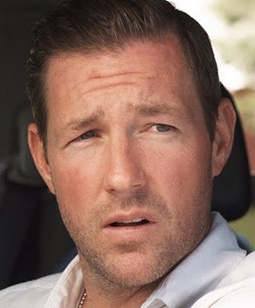
Take a well known filmmaker and actor with studio movies and A-list co-stars to his credit, and add a twenty-five thousand dollar budget, a skeleton camera crew and a few unknown actors looking for a break... Edward Burns constructed this anomalous filmmaking approach with his latest indie release Nice Guy Johnny.
When I first sat down to screen Nice Guy Johnny, I couldn't imagine what to expect, as I contemplated the above ingredients. It reminded me of a line from the Steve Martin movie, Bowfinger (1999, Universal), in which Martin's character, a fledgling filmmaker declares, "Cash... all movies cost $2,184.00," as he proudly displays his meager production savings. The obvious difference: Edward Burns didn't have to make a film of the five-figure variety. He chose to. Our discussion largely centered around why Edward Burns elected to take on the challenge of producing a film on a shoestring at this stage in his career.
As I've often expressed, I learn something from almost every person I interview. Edward Burns taught me to remember that you don't have to wait for permission from others to pursue a worthy project. Burns' film Nice Guy Johnny was devoid of the dreaded artistic compromises that often plague filmmakers, both new and established alike. His refusal to make certain compromises did push him to be innovative in his approach by crafting a way to effectively make Nice Guy Johnny on his own terms, subsequently licensing the film to distributors on his own, and through digital mediums.
Edward Burns also reminded me of something that all of us tend to forget from time to time; there is no mountaintop. There is only the infinite journey. Regardless of where one is in their career, there will always be road behind you and plenty of road ahead of you with new challenges to overcome.
Burns admits growing weary with some of the financial pratfalls, politics and star-wrangling that goes along with financing and casting larger scale films. For Nice Guy Johnny, Burns drew inspiration from his breakthrough production, The Brothers McMullen, and just may have changed the landscape of the independent film business in the process.
PR.com (Allison Kugel): Why go back, at this point in your career, and make a film for only twenty-five thousand dollars?
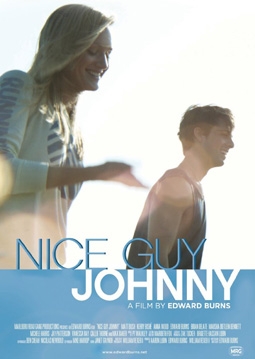
Edward Burns: A couple of different reasons. Given what the movie is about, this idea of having your dreams and holding on to them, fighting for them, and what it could cost you and how you are going to disappoint people if you chase them... my producing partner, Aaron Lubin, and I had a lot of conversations about who I was as a twenty-four year old kid when I was trying to make The Brothers McMullen. So we had McMullen on the brain. When we were deciding our approach to this production, we had spent the last couple of years trying to get another film off the ground. You attach a bunch of well known actors, which we did, and then you take it out into the marketplace and you try to raise the money that way. We found that we didn't enjoy that process. Any time we were asking somebody for money there is a lot of interference that comes along with it: notes on the script, ideas of who they want to cast, changes to the title. So we just thought, given all of these conversations about The Brothers McMullen, what if we tried to do that model again? What if we challenged ourselves and limited ourselves to twenty-five thousand dollars, shot it in under twelve days, only used a three-man crew and got the locations for free? And trying to get those name actors, it's a long and painful process. We thought, "Look at all those kids [in New York]." I was one of them! [After] McMullen, we all got careers out of that movie, and it was probably the most fun I've ever had making a film. So we wanted to re-create that. Once we jumped in we fully embraced the size and scale of the production. The actors, Matt Bush, Kerry Bishe and Anna Wood were willing to do their own hair and makeup, wear their own clothes and help us out when we needed assistance, crew-wise.
PR.com: I watched the film, and it wasn't short on story or on entertainment value. It certainly delivered in those capacities. You could tell that there were scenes where it was a single camera set up or where you were using natural light...
Edward Burns: That's right...
PR.com: So why don't more filmmakers make films this way?
Edward Burns: I think you have to be willing to make smaller stories. It would be very difficult to make an action film on that budget, or a thriller, or anything that would require car chases or a lot of extras. All of those things would be almost impossible to do with that small of a crew and with that low budget. But if you like small character-driven stories then this is a model that can absolutely work for you, and those are the only kind of films I've ever made. We made a film like The Groomsmen (2006) for three million dollars and had to deal with a bunch of headaches that came along with asking someone for three million dollars. We could have made that movie for twenty-five thousand dollars with a bunch of unknowns, and probably made a better movie and had a lot more fun. You have to look at the list of comprises that you're going to be ok with. If you're ok with working on a short schedule and re-working your script that so it's smaller in scale, then this is a model that works for you. Or, you have to deal with someone who is going to give you the money and change your title and your dialogue, and tell you who to put in the movie. That's a list of compromises I've never been ok with.
PR.com: You're all about creative control.
Edward Burns: Yes.
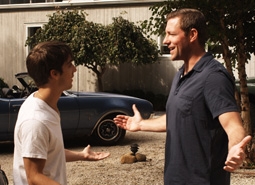
PR.com: Are you a control freak in general, or just when it comes to making movies?
Edward Burns: I think just when it comes to making movies. Quite honestly, it's less about being a control freak, and more just out of necessity. I've gone through the process where you don't have all of the control. Then the movie comes out, and let's say it doesn't do as well as you had hoped. Ten years later that movie lives on a shelf, or on a DVD, or on cable television and other people don't know the story behind it, only you do.
PR.com: They don't know the politics of the situation, or the places where you had to compromise and you didn't want to compromise.
Edward Burns: Exactly.
PR.com: How did you go about finding these young actors for Nice Guy Johnny? How was the casting process?
Edward Burns: I went to the same casting directors that I've been using for years, Laura Rosenthal and Maribeth Fox. Something that happened over the years is we'll find these great kids in New York who are unknown and we won't be able to cast them in the film because they're not a well known name yet; that's how you get these movies financed. So given that we didn't have to deal with that on this one, we said, "Let's just find the unknowns in New York who keep knocking on the door but are unable to get cast in that network television show or in the studio film because they're not famous yet. And maybe we can help break a couple of young actors in New York."
PR. com: Do you know what's going on with their careers since some of the buzz came out around Nice Guy Johnny?

Edward Burns: Kerry Bishe who plays Brooke; she was immediately signed by a major agency in LA and called in for a meeting with Steven Spielberg, and she got cast in the new Kevin Smith movie. Mattie Bush just got cast in the lead in a show on TBS. Those two are doing amazingly well in a short amount of time.
PR.com: How does that feel for you, as someone who allowed that to happen for them?
Edward Burns: It feels great, because they are such great kids. I just hope that I'm going to be able to afford them a couple of years from now.
PR.com: I think they owe you a few favors. So these young struggling actors in New York find out they're getting cast as the leads in an Ed Burns film, but there's hardly any money. Did they get paid?
Edward Burns: Yeah, they got paid the low budget SAG deal. And anyone who has worked on an indie film, for the most part, that's what all of us get paid. For them, I can't speak to their excitement about being in an Ed Burns film, but I know neither one of them had ever been the lead in a film. Kerry Bishe, really, had never been in a movie before. She had done a pilot or two. Matt, I think, had been in one film. But they primarily did commercials and theatre. The idea that they were being cast as the leads in a feature film is what they were probably most excited about. My process of working with them is that I like to collaborate with my actors. I encourage them to come to me with whatever ideas they have, and even line changes. They both responded to that and they helped me turn those into pretty special characters.
PR.com: What is your own comfort level when you're on a set for a big studio film? Some of the larger films that you've done, for example Saving Private Ryan, and the film you recently did with Katherine Heigl (27 Dresses), are you comfortable on those sets or do you feel like a fish out of water?
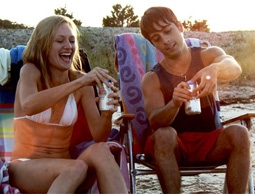
Edward Burns: Very comfortable. There's usually somebody there getting you coffee and lunch, you get a big camper and everyone treats you like a king. They're usually very pleasant and comfortable experiences. That said, usually when I finish one of those [films] I get very antsy to jump back into the indie waters, and think about what my next film is going to be.
PR.com: But do these larger films feel like a creative atmosphere or do they feel more structured and more corporate?
Edward Burns: No, that kind of stuff stems from the top, whether it's the filmmaker or the producer. Some of them are very creative and collaborative, and some other ones are the complete opposite of that. It varies from film to film.
PR.com: How do you view your relationship with your fan-base and with the movie-going public in general?
Edward Burns: As a filmmaker you take your films out to festivals and to screenings at film societies and film schools. And you'll always get to meet your fans that way, and talk to them. But mine, obviously they like movies, but they also want to know how to make a movie for a million dollars, or how to make a movie for three million dollars. Or they'll ask, "How did you get that shot?" With this film (Nice Guy Johnny), we've probably gone to fifteen different cities with it. I've had probably more interaction with the people who like my movies than I have had in a long time. Now, using social media, whether it's Twitter or Facebook, there is a lot more back and forth between you and the people that like your films. Even via Twitter, meeting up with people at festivals that you have had some form of communication with virally.
PR.com: What has the industry feedback for Nice Guy Johnny been?
Edward Burns: The good thing is that everybody seems to really like the movie. On the indie side, everybody is dying to know how the model has worked and are we happy with the result. The answer is, yes, we are very happy. We are only [a few] weeks into it so the final numbers aren't in, but we're already doing better than we could have hoped. On the studio side, people are just sort of curious. I don't think they view this type of release as any sort of threat to their business. But most of them are film fans and appreciate that what we are trying to do is reach as wide an audience as we possibly can, so they certainly respect that.
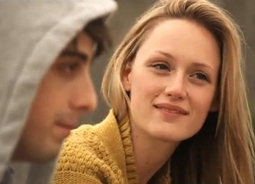
PR.com: Breakdown this distribution model for me. Do you own the film, and you're selling or licensing distribution to each platform individually?
Edward Burns: We own it, but we license it to a company called FilmBuff and then they deliver it to the different digital platforms; those two primary platforms are iTunes and On Demand. We've been lucky that certain cable providers like Comcast and Time Warner have really gotten behind the idea of indie films being delivered directly into your living room, and have given the movie a big push. Comcast, especially, they recognize with these indie distribution companies going out of business and indie theatres closing around the country, why shouldn't your On Demand channel replace the art house theatre. Timing-wise it was perfect for us, because as we were releasing Nice Guy Johnny, they were thinking about that. Then there are all of these other digital platforms that I was unaware of where people are watching movies, like Xbox, Playstation, Amazon, Hulu... streaming has become a big deal. We're across all those platforms. It's almost impossible for a small film to make money with a theatrical release. You're almost guaranteed to lose money and we just didn't want to go that route again.
PR.com: Is this going to revolutionize the way films are brought to the public? And is this distribution model resting on your shoulders, where if you are successful there will be a paradigm shift with film distribution?
Edward Burns: I don't know about a revolution, but I definitely think other likeminded filmmakers are probably going to follow suit. That said, this isn't Little Miss Sunshine, Napoleon Dynamite time where you're going to make millions upon millions of dollars. You're going to make a nice tidy profit, but you're going to make enough money to make another film. That's why I say "likeminded filmmakers." If that's the name of the game for you, to continue to tell your stories and make your films, then this model can work for you.
PR.com: What you're really about is telling stories about people, and about the human experience. That's what drives you as a filmmaker.
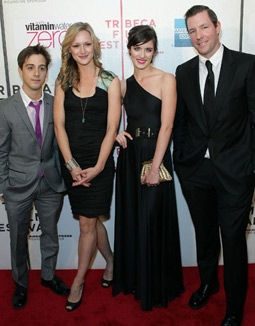
Edward Burns: I'm on my ninth film, and that's kind of all I've explored. My whole thing is, I look at the world I live in, hold a mirror up to it and try to reflect it back as honestly as I can and with some humor.
PR.com: What kinds of movies get you out of the house and into a movie theatre?
Edward Burns: I have two little kids now, so we usually go to the theatre just to see kids' movies, like Despicable Me is the last one we just saw, and Megamind. And only on occasion for the great big blockbuster will we go to the theatre. But for movies like this (referring to "Nice Guy Johnny"), part of my decision to embrace iTunes and On Demand is because for the last four years since my son was born, I only watch indie films On Demand. I live in New York City a couple of blocks away from two art house theatres, and if I'm not leaving the house to go see the movie at the art house, I have to imagine most other people aren't either.
PR.com: Referencing your first film, The Brothers McMullen, you had said that Irish-Americans are the forgotten minority, and you obviously told the story of an Irish-American family in that film. What other stories about Irish-Americans would you like to tell?
Edward Burns: I have this dream project that I wrote years ago, which is sort of an Irish-American multi-generational Godfather-esque epic about a family, and it's set against the police department in New York in the sixties and seventies. But that is probably a ninety-million dollar movie! So if Nice Guy Johnny reeaaally explodes (laughs)... maybe then. No. But at some point maybe I will get the opportunity to make that movie.
PR.com: That's worth kissing ass for to get the money, wouldn't you say?
Edward Burns: Oh, big time (laughs).
Edward Burns' latest film, "Nice Guy Johnny," is currently available on In Demand and on iTunes. View the film's trailer at niceguyjohnnythemovie.com.
